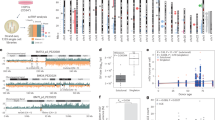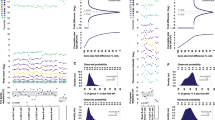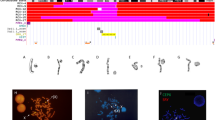Abstract
A longitudinal cytogenetic study of blood samples from mosaic mongols has given suggestions that cell selection of either normal or trisomic cells occurs in young infants.
This is a preview of subscription content, access via your institution
Access options
Subscribe to this journal
Receive 51 print issues and online access
$199.00 per year
only $3.90 per issue
Buy this article
- Purchase on SpringerLink
- Instant access to the full article PDF.
USD 39.95
Prices may be subject to local taxes which are calculated during checkout
Similar content being viewed by others
References
Ford, C. E., Foundation Study Group No. 25 in Mongolism CIBA, 71 (J. and A. Churchill Ltd, London, 1967).
Hall, B., Lancet, ii, 1026 (1962).
Moore, M. K., and Engel, E., Sth. Med. J., 61, 146 (1968).
Penrose, L. S., unpublished 1964, but quoted in Penrose, L. S., and Smith, G. F., Down's Anomaly (J. and A. Churchill Ltd, London, 1966).
Degenhardt, K. H., and Franz, J., German Med. Monthly, 12 (7), 338 (1967).
Richards, B. W., J. Ment. Subnormality, 13, 3 (1967).
Author information
Authors and Affiliations
Rights and permissions
About this article
Cite this article
TAYLOR, A. Cell Selection in vivo in Normal/G Trisomic Mosaics. Nature 219, 1028–1030 (1968). https://doi.org/10.1038/2191028a0
Received:
Issue date:
DOI: https://doi.org/10.1038/2191028a0
This article is cited by
-
Mosaicism in health and disease — clones picking up speed
Nature Reviews Genetics (2017)
-
Causes and consequences of aneuploidy in cancer
Nature Reviews Genetics (2012)
-
Chromosomal mosaicism: a follow-up study of 39 unselected children found at birth
Human Genetics (1991)
-
Dissociation of a t(12;21) resulting in a normal cell line in two trisomic 21 sons of a nonmosaic t(12;21) father?
Human Genetics (1983)
-
Cell selection in vivo
Human Genetics (1980)



